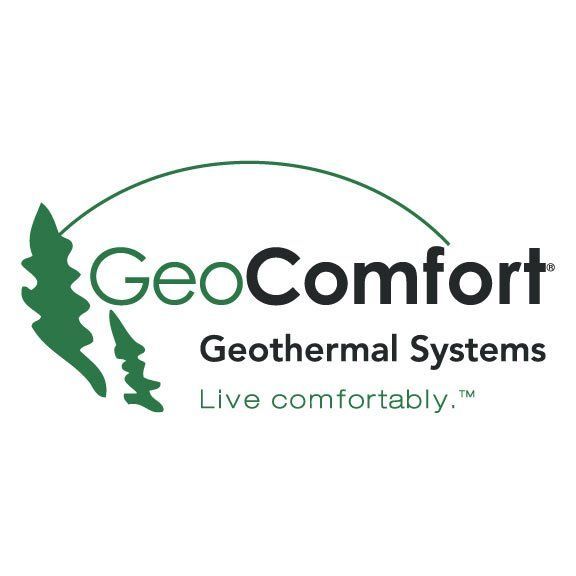Trusting Top Brands like GeoComfort Since 1994
Trusting Top Brands like GeoComfort Since 1994
Understanding Geothermal Systems
Geothermal systems are so much more than simple heating and cooling system. They are quiet, offer lower operating costs than conventional systems, do not utilize flammable fossil fuels to operate, offer hot water for use in your home as a bonus, and so much more. GeoComfort is constantly looking for ways to improve efficiency and give homeowners more options to minimize their carbon footprint. From solar to geothermal heating, cooling, and hot water, GeoComfort continually provides consumers with access to the information they need to make their homes more energy efficient.
GeoComfort geothermal systems may reduce monthly heating and cooling bills by up to 70% over conventional systems. Operating costs are not subject to the fluctuations associated with fossil fuel pricing. The average life expectancy of a geothermal unit is nearly 25 years compared to the average 13-year life expectancy of conventional systems. Geothermal units have lower maintenance costs due to the equipment being indoors, where it is not exposed to the elements. They also have fewer moving parts which provide less opportunity for malfunction. GeoComfort geothermal systems provide long-term value to a home and are becoming attractive selling points in the real estate market.
Understanding Geothermal Systems
Geothermal systems are so much more than simple heating and cooling system. They are quiet, offer lower operating costs than conventional systems, do not utilize flammable fossil fuels to operate, offer hot water for use in your home as a bonus, and so much more. GeoComfort is constantly looking for ways to improve efficiency and give homeowners more options to minimize their carbon footprint. From solar to geothermal heating, cooling, and hot water, GeoComfort continually provides consumers with access to the information they need to make their homes more energy efficient.
GeoComfort geothermal systems may reduce monthly heating and cooling bills by up to 70% over conventional systems. Operating costs are not subject to the fluctuations associated with fossil fuel pricing. The average life expectancy of a geothermal unit is nearly 25 years compared to the average 13-year life expectancy of conventional systems. Geothermal units have lower maintenance costs due to the equipment being indoors, where it is not exposed to the elements. They also have fewer moving parts which provide less opportunity for malfunction. GeoComfort geothermal systems provide long-term value to a home and are becoming attractive selling points in the real estate market.
Frequently Asked Questions About Geo Comfort Systems
-
Are there any incentives offered for installing a geothermal system?
Yes! Congress passed a revised tax credit for homeowners who install geothermal units. The tax credit covers new installations and the replacement of existing geothermal units. Most utility cooperates offer rebates, as well.
-
How efficient is a ground source heat pump, also known as a geothermal system?
Ground source heat pumps are some of the most efficient residential heating and cooling systems available today, with heating efficiency 50 to 70% higher than other heating systems and cooling efficiency 20 to 40% higher than available air conditioners. That directly translates into savings for you on your utility bills.
-
Can one system provide both space heating and cooling for my home? And what about heating hot water?
Yes. A geothermal system can be a combination of heating/cooling and hot water heating system. You can change from one mode to another with a simple flick on your indoor thermostat. Using a desuperheater, some geothermal systems can save you up to 50% on your water-heating bill by preheating tank water.
-
How does a geothermal system heat water for my home?
Using what is called a desuperheater, geothermal units turn waste heat to the task of heating hot water. During the summer, when the system is in cooling mode, your hot water is produced free as a byproduct of the thermal process. In winter, with the heating mode, the desuperheater heats a portion of your hot water. Desuperheaters are standard on some units, and optional on others. Stand-alone systems that will heat water all year around can be purchased.
-
What about comfort?
A geothermal system moves warm air (90-105(F) throughout your home or business via standard ductwork. An even comfort level is created because the warm air is moved in slightly higher volumes and saturates the building with warmth more evenly. This helps even out hot or cold spots and eliminates the cold air blasts common with fossil fuel furnaces.
-
How much does a geothermal system cost?
The initial investment for a geothermal system is greater than that of a conventional system. However, when you consider the operating costs of a geothermal heating, cooling, and water heating system, energy savings quickly offset the initial difference in the purchase price.
-
Are geothermal systems difficult to install?
Most units are easy to install, especially when they are replacing another forced-air system. This is known as a retrofit. Geothermal heat pumps can be installed in areas unsuitable for fossil fuel furnaces because there is no combustion and thus no need to vent exhaust fumes. Ductwork must be installed in homes without an existing air distribution system. Butler Heating and Air can assess the cost of installing ductwork.
-
How far apart are trenches and vertical boreholes spaced?
Trenches are spaced four to five feet apart, while boreholes are spaced ten to fifteen feet apart.
-
How long does it take to install a horizontal system vs. a vertical system?
In regards to a horizontal system, this depends on soil conditions, length and depth of pipe, and equipment required. A typical installation can be completed in one or two days. For a vertical installation, time varies with conditions on the site such as type and depth of the overburden, type and hardness of the bedrock, and the presence of aquifers. Typical drilling times are one or two days; total installation can usually be accomplished in two days.
-
What are the advantages and disadvantages of horizontal and vertical installations, respectively?
Horizontal installations are simpler, requiring lower-cost equipment. However, they require longer lengths of pipe due to seasonal variations in soil temperature and moisture content. Since a horizontal heat exchanger is laid out in trenches, a larger area is usually required than for a vertical system. Where land is limited, vertical installations or a compact Slinky horizontal installation can be ideal. If regional soil conditions include extensive hard rock, a vertical installation may be the only available choice. Vertical installations tend to be more expensive due to the increased cost of drilling versus trenching, but since the heat exchanger is buried deeper than with a horizontal system, vertical systems are usually more efficient and can get by with less total pipe. Butler Heating and Air will be able to help you decide which configuration best meets your specific needs.
-
What are the environmental benefits of geothermal systems?
Currently, installed systems are making a huge difference in our environment! The systems are eliminating more than three million tons of carbon dioxide, and is equivalent to taking 650,000 automobiles off the road. Geothermal systems conserve energy and, because they move heat that already exists rather than burning something to create heat, they reduce the number of toxic emissions in the atmosphere. They use renewable energy from the sun, and because the system doesn't rely on outside air, it keeps the air inside of buildings cleaner and free of pollen, outdoor pollutants, mold spores, and other allergens.
-
Will an underground loop affect my lawn or landscape?
No. Research has shown that loops have no adverse effects on grass, trees, or shrubs. Most horizontal installations require trenches about six inches wide. Temporary bare areas can be restored with grass seed or sod. Vertical loops require little space and do not damage lawns significantly.
-
My yard contains many shade trees. Will this affect ground temperature and my ability to use it as an energy source?
Not at all. The system is installed deep enough that it utilizes constant ground temperatures.
-
Can a geothermal system be added to my fossil fuel furnace?
Yes. Called dual systems, they can easily be added to existing furnaces for those wishing to have a dual-fuel heating system. Dual-fuel systems use the geothermal system as the main heating source and a fossil fuel furnace as a supplement in extremely cold weather should additional heat be needed.

★★★★★
Butler Heating and Air has gone above and beyond for us. We have a Trane unit in our house on three different zones and it’s highly efficient. If there’s an issue their tech team is quick to assist any problem.
~ Mallory S.
★★★★★
Took a bit to get a service man out but that's to be expected in a missouri summer. He was friendly and fast. It wasn't super expensive and the office lady was always kind.
~ Kayla H.
★★★★★
We’ve had excellent experiences with Butler Heating and Air. Adam came out on two occasions for repairs. He was very knowledgeable and professional and easy to communicate with. He really seemed to care about what was in our best interests. He was able to fix the 32-year-old system, but we made the decision to move onto a new HVAC unit. Todd came out and spoke to us on options. He was down to earth, easy to talk to, and had a super great style and perspective. The crew came out a few days after we made the decision to replace. They set up a beautiful HVAC unit and explained how to use the thermostat, filter changes and cleaned everything up spic and span when they left. Becky in accounts was equally awesome. This company deserves having a look at.
~ Richard H.







